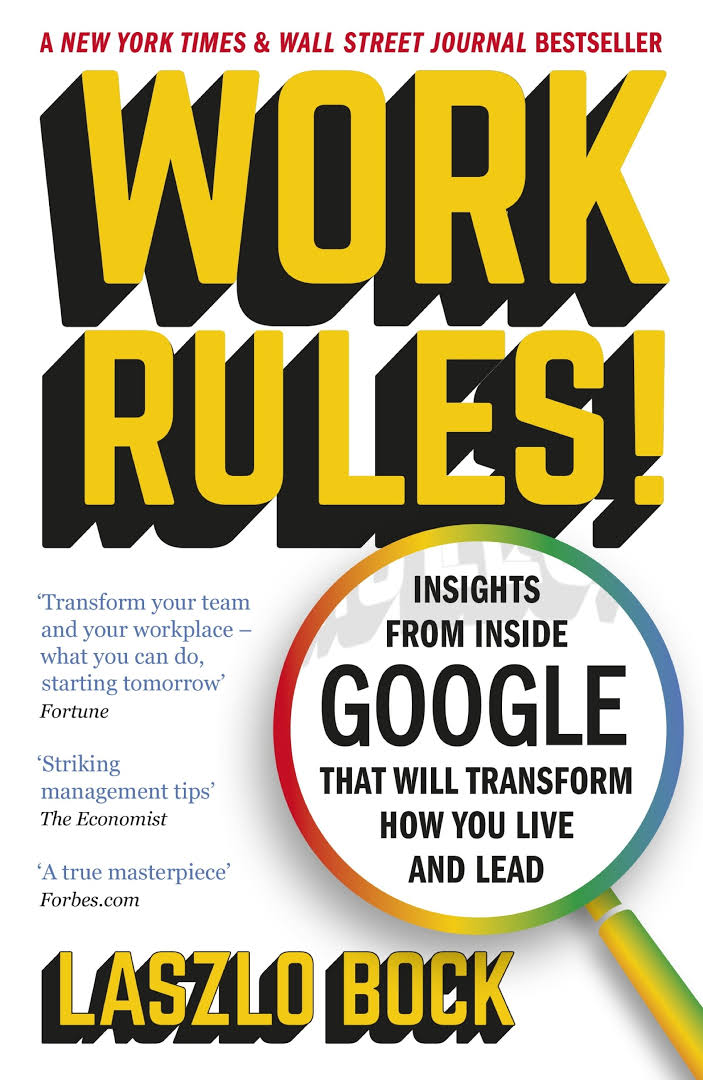I had been advised many times to read Work Rules! with Subtitle “Insights from inside Google that will transform how you live and lead”, yes, another book about Google but not just another.
I just began reading it and the first pages are revealing: a company success is linked to its culture, and its culture comes from its founders. So Bock talks about Page and Brin early life. He refers to three portraits, Larry Page: Google should be like a family by Adma Lashinsky, Fortune, 2012; Larry Page’s University of Michigan Commencement Address in 2009; and The Story of Sergey Brin by Mark Malseed, Moment, 2007. Let me extract a few little things:
My father’s father worked in the Chevy plant in Flint, Michigan. He was an assembly line worker. He drove his two children here to Ann Arbor, and told them: That is where you’re going to go to college. Both his kids did graduate from Michigan. That was the American dream. His daughter, Beverly, is with us today. My Grandpa used to carry an “Alley Oop” hammer – a heavy iron pipe with a hunk of lead melted on the end. The workers made them during the sit-down strikes to protect themselves. When I was growing up, we used that hammer whenever we needed to pound a stake or something into the ground. It is wonderful that most people don’t need to carry a heavy blunt object for protection anymore. But just in case, I have it here.
It is said that the future of any nation can be determined by the care and preparation given to its youth. If all the youths of America were as fortunate in securing an education as we have been, then the future of the United States would be even more bright than it is today.
And about Brin entrepreneurship skills or unique personality: The Brins’ story provides me with a clue to the origins of Sergey’s entrepreneurial instincts. His parents, academics through and through, deny any role in forming their son’s considerable business acumen — “He did not learn it from us, absolutely not our area,” Michael says. Yet Sergey’s willingness to take risks, his sense of whom to trust and ask for help, his vision to see something better and the conviction to go after it — these traits are evident in much of what Michael Brin did in circumventing the system and working twice as hard as others to earn his doctorate, then leave the Soviet Union.
“I do somewhat feel like a minority,” he says. “Being Jewish, especially in Russia, is one aspect of that. Then, being an immigrant in the U.S. And then, since I was significantly ahead in math in school, being the youngest one in a class. I never felt like a part of the majority. So I think that is part of the Jewish heritage in a way.” Today, of course, being a young billionaire, he’s again in a class by himself. “I don’t feel comfortable being one of the crowd,” he reflects. “It’s kind of interesting — I really liked the schools that I went to, but I never rooted for the sports teams. I was never one of the crowd supporting something or not. I like to maintain my independence.”
A final note of serendipity in what I just read: The history of Russian Jewish emigration in the mid-1970s can be neatly summarized in a joke from the era: Two Jews are talking in the street, a third walks by and says to them, “I don’t know what you’re talking about but yes, it’s time to get out of here!” Just have a look at my recent post about A History Of Communism Told Through Communist Jokes. Nice coincidence…

